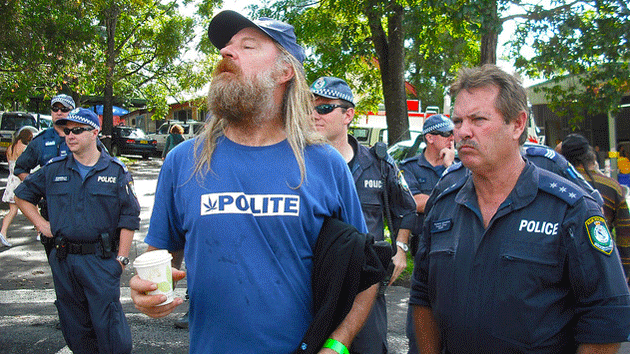
<a href="http://flickr.com/link-to-source-image">mardi grass 2011</a>/Flickr
California was the first state to legalize medical marijuana, but like the pimply-faced stoner dude you may have known in high school, it hasn’t had the healthiest of relationships with Mary Jane. The Golden State differs from most others with medical pot laws in that it doesn’t actually regulate production and sale of the herb. Instead, it lets cities and counties enact their own laws—though in practice most haven’t. The result has been the Wild West of weed: Almost any adult can score a scrip and some bud from a local dispensary, assuming, of course, that it hasn’t yet been raided and shut down by the feds.
But all of that might be about to change. The California Police Chiefs Association (CPCA) recently announced support for a bill that would put the state in the business of regulating the medical pot trade. Though you’d think cops would have pushed for such a thing decades ago, the reality is quite the opposite: The CPCA and other law enforcement organizations have, until now, opposed pretty much every reform to California’s medical marijuana system for fear that anything short of completely abolishing it would legitimize it.
The CPCA’s change of heart “is a huge for us,” says Nate Bradley, executive director of the California Cannabis Industry Association, the state’s marijuana industry trade group. Bradley agrees with his police adversaries that tighter regs would legitimize medical marijuana, which is why the CCIA has pushed for them since the group’s inception four years ago. Bolstering his case, the US Department of Justice last year announced that it would no longer raid dispensaries in states that it believes are regulating them adequately—a formulation that seemed to exclude California. New rules issued last month by the Obama administration allow banks to accept funds from pot dealers, but only if they’re licensed in the state where they operate.
So why are California’s drug warriors reversing course? “We could no longer ignore that the political landscape on this issue was shifting,” the CPCA explained in a letter written jointly with the League of California Cities. Polls and changing federal policies suggest that medical pot reform “could be enacted,” and that “without our proactive intervention, it could take a form that was severely damaging to our interests.”
The bill that law enforcement groups are backing, SB 1262, is flawed, but it’s something that “we can work with,” says Bradley, who previously worked as a cop in California’s Yuba County. Advocates of medical pot don’t like how the bill constrains the ability of doctors to recommend marijuana, outlaws potent pot concentrates such as hash oil, and puts regulation in the hands of the Department of Public Health, rather than the Department of Alcoholic Beverages Control.
Ultimately, the fight is a proxy for what comes next: A 2016 ballot measure to legalize recreational marijuana. The pot industry wants the California ABC to regulate medical pot so that it can transition seamlessly to regulating recreational pot. Police interests, on the other hand, want to discourage outright legalization by empowering the Department of Public Health to draw a brighter line between the medical and recreational uses of pot.
Either way, Bradley sees the reform of California’s dysfunctional medical marijuana system as a win. “Tight, workable regulations are way better than no regulations,” he says, “because with no regulations, you get your doors kicked in.”













